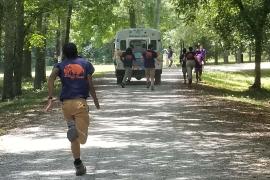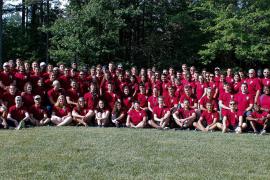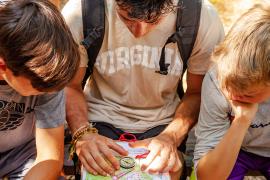“Thank you for this summer. I’ve loved every bit of it. This has been the best summer I’ve had. I’ve made new friends and done a load of new things. I think this has changed me as a person.”
Camp’s profound impact motivates me as I recruit people to join our staff.
When the first-year staff member who shared such passionate gratitude asks to come back for a second summer, “returner expectations” are one of the first considerations I ponder. How can I position this person to exceed the positive experiences they had during their first summer? How can our leadership team support their growth while continuing to give to our community?
I’ve found it helpful to reference this approach as much as possible during the hiring process. Our leadership team members discuss and train to improve the second-year staff member experience and watch out for those who seem less engaged throughout the camp season. I want to be sure the second-year staff members' end-of-summer surveys are just as passionate as they were about camp after year one.
These are strategies that have been successful for us to consider implementing:
Set the goal of exceeding their first summer experience.
Ask staff members about their goals and how they want the upcoming summer to exceed the previous summer. Ask them to share some of their challenging moments and reflect that, by the end of the summer, the positive experiences outweighed anything uncomfortable or discouraging.
Train to exceed expectations.
Be intentional about letting each staff member know how valuable their contribution will be during a pre-summer call and remind them that not everyone is asked to return as an employee — but they were. Commend them for their level of commitment. Have leadership team members meet with second-year staff during the early part of in-person training period. Consider inviting a third-year staff member to these meetings so they can share their successes and unexpected challenges from their second summer.
Pay attention to their experience.
In the first few weeks when the kids arrive, I’ve been fortunate to see many second-year staff members thriving. They emerge as cabin and activity leaders and trusted lieutenants for their supervisors. But have leadership team members be on the lookout for those who seem fatigued, lethargic, and “are going through the motions.” Sometimes these staff members long for people who did not return or question camp policy changes. Proactively coach these staff members to “stay in the moment.”
Be intentional about creating “on ramps” toward leadership.
If a second-year staff member has a stellar start to their summer, our leadership team approaches them about paths toward earning a middle management job. I can often offer them opportunities to step in for their supervisor (likely when that person is on a day off) or join them for a strategic planning meeting. The second-year staff members have shared that they enjoy the added responsibility and the opportunity to work with more experienced leadership staff members. Also consider inviting them to join additional training sessions, special meals, or given them swag to recognize their growth.
Fostering the next camp leaders is a constant endeavor, and the positive outcomes of a more seasoned staff are priceless. While onboarding new people to your program requires a lot of attention, the second-year staff members need to know they are valued and that the camp experience will provide more opportunities to grand contribute.
This blog was written on behalf of ACA's Project Real Job, whose goal is to support camps in their efforts to recruit, hire, and retain staff.
Photo courtesy of Camp Ton-a-Wandah in Hendersonville, NC
Dave Schiff is the co-owner of Camp Manitou in Oakland, Maine. He is co-chair of ACA’s Staff Recruitment and Retention Committee/Staffing Summit and chairs the Maine Summer Camps ad-hoc Staffing Committee. He can be reached at [email protected].
The views and opinions expressed by contributors are their own and do not necessarily reflect the views of the American Camp Association or ACA employees.




